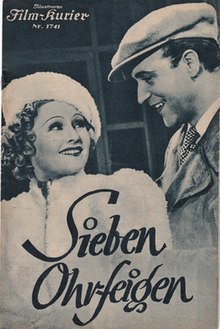| Seven Slaps | |
|---|---|
 | |
| Directed by | Paul Martin |
| Written by |
|
| Based on | Hét pofon (novel) by Károly Aszlányi |
| Produced by | Max Pfeiffer |
| Starring | |
| Cinematography | Konstantin Irmen-Tschet |
| Edited by | Carl Otto Bartning |
| Music by | Kurt Schröder |
Production company | |
| Distributed by | UFA |
Release date |
|
Running time | 97 minutes |
| Country | Germany |
| Language | German |
Seven Slaps (German: Sieben Ohrfeigen) is a 1937 German comedy film directed by Paul Martin and starring Lilian Harvey, Willy Fritsch and Alfred Abel. Like the earlier Lucky Kids , which had the same director and stars, it was an attempt to create a German version of screwball comedy. While the previous film had a New York setting, this takes place in London. [1] It was shot at the Babelsberg Studios in Berlin. The film's sets were designed by the art director Erich Kettelhut. It was loosely remade in 1970 as Slap in the Face .